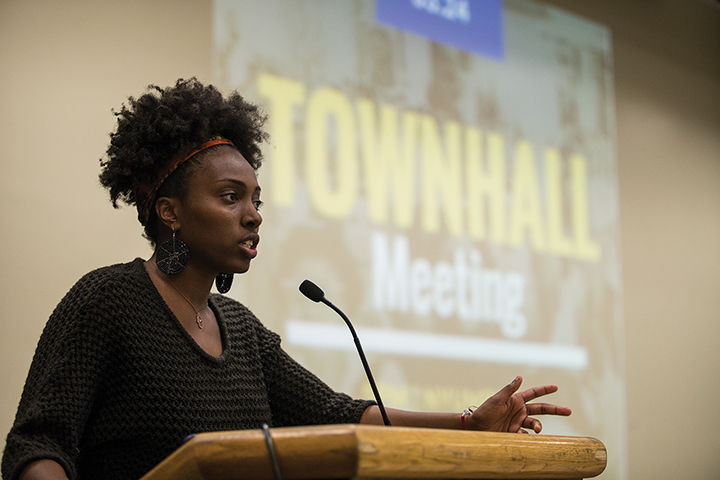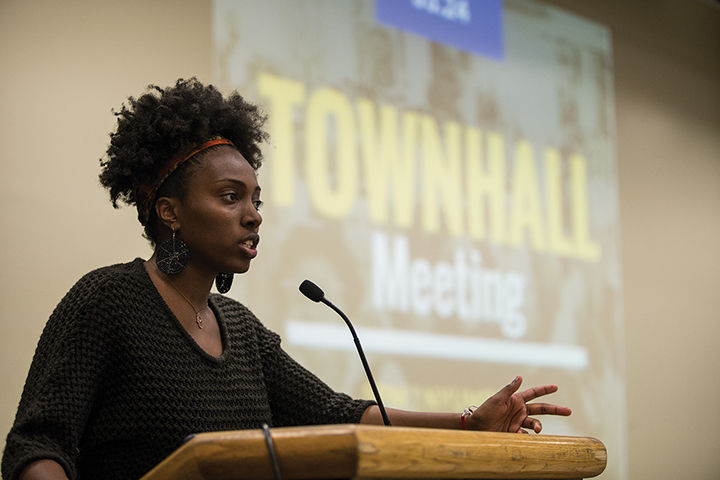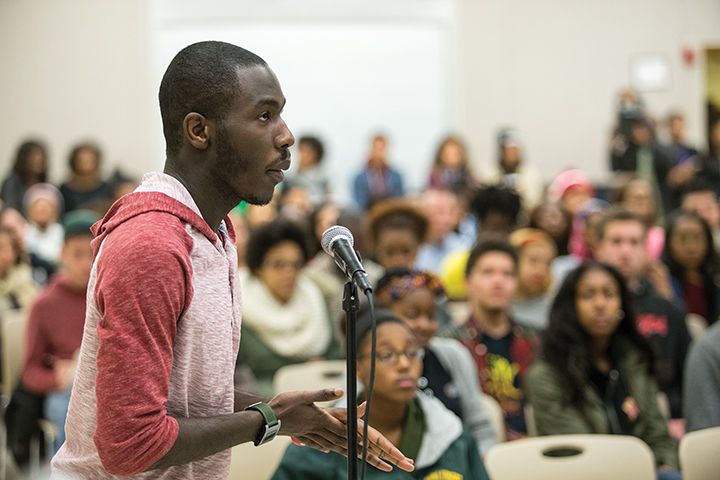Tears welled up in sophomore Kayla Tarrant’s eyes as she expressed worries that someone she might have convinced to come to this university as a tour guide would experience racial discrimination — especially in light of the offensive Kappa Sigma email leak.
“When I was visiting schools, I had 30 tour guides and none of them were black, so I decided to become one,” the communication major said. ”This semester, I decided to not be one. People tell me I’m the reason they want to come to UMD, and I would feel horrible if they were called something on campus, raped or not let into a fraternity.”
About 100 students gathered in Nyumburu Cultural Center yesterday for a town hall meeting sponsored by this university’s chapter of the NAACP to discuss an email sent by a former Kappa Sigma fraternity member to six other members in January 2014. The message, which leaked online two weeks ago, used racial slurs, sexist comments and the phrase “f— consent.”
The viral email prompted condemnation from university officials, including Chief Diversity Officer Kumea Shorter-Gooden and university President Wallace Loh, who called for greater dialogue in a Twitter chat and through public statements.
The national Kappa Sigma fraternity issued a statement that denounced the email and stated that this university’s chapter was working to formally expel the member involved, cooperate with the university and request diversity training for its members.
But some students said they were left wanting more substantial action to address the root of the problem. At the town hall, attendees shared a sense of marginalization as they discussed the email, race relations on the campus and what steps should be taken to work toward greater racial harmony.
Junior Michael Mpamaugo stood before those gathered and shared a story about how a white student once referenced a rap song and asked Mpamaugo if he could “teach him to how to be black.” Mpamaugo said he explained to the student that he wants to be an engineer, not a rapper.
“Many people just have this idea that black people can only be a few things,” the civil engineering major said. “I definitely think this has a relation to [the Kappa Sigma email], because there isn’t full understanding from both sides.”
Other students lamented the privilege they said was awarded to predominantly white fraternities.
“These institutions of white, privileged, heterosexual males let them look beyond the issues that members of other races are dealing with,” said sophomore Tam-Anh Nguyen, a communication and film major.
Along with university officials, Greek life associations, including the Interfraternity Council, National Panhellenic Council and the Multicultural Greek Council, all released statements condemning the email following the incident.
“Those who read the email should be upset, should be surprised, and should expect better, because the IFC does,” the Interfraternity Council statement regarding the email read. “We will do whatever we can to eradicate any tolerance of violence against women, disrespect, integrity, and unity, regardless of their identity.”
A portion of the discussion also focused on the university response to the incident, which some felt was superficial. Nguyen said she feels this university is more interested in selling black students as “commodities” so as to appear diverse, rather than supporting them as human beings.
Nguyen advocated getting rid of predominantly white fraternities to combat the offensive behavior making nationwide headlines.
Another solution suggested at the meeting was to require mandatory diversity training for fraternities and sororities facilitated by minority student organizations. Moriah Ray, vice president of this university’s chapter of the NAACP, said she thinks that option presents the most achievable goal.
“We need something more effective than a university official talking about why racism is bad,” the senior government and politics major said. “We need one-on-one training, face-to-face, to not only tell people what not to say or do, but also why saying or doing those things is offensive.”
Tarrant said the event brought positive ideas, but she was discouraged by the lack of white students who attended the meeting. There were no IFC fraternity members or university representatives who spoke at the meeting.
“There should never be an event on a campus that is 55 percent white that has maybe five white students show up,” she said. “We aren’t that far off; we are in your classes and in your community, but you still don’t care.”
CORRECTION: Due to a reporting error, a previous version of this story incorrectly stated that the offensive, viral email affirmed Kayla Tarrant’s decision to quit her job as a university tour guide. Tarrant plans to continue her job as a tour guide next fall, and racism and the email were unrelated to her job. Tarrant said recent campus events reflect what she would not like to see happen to people she encourages to come to the university.
Tarrant was also misquoted in the quote that states, “This semester, I decided to not be one because people tell me I’m the reason they want to come to UMD, and I would feel horrible if they were called something on campus, raped or not let into a fraternity.” The quote should read, “This semester, I decided to not be one. People tell me I’m the reason they want to come to UMD, and I would feel horrible if they were called something on campus, raped or not let into a fraternity.”
This article has been updated to reflect these changes.
Moriah Ray, a senior government and politics major, introduces the issues that will be talked about at a Town Hall meeting held in the Nyumburu Cultural Center on Tuesday, March 24.
Akeel Alleyne, a senior Chinese major and vice president of the Alpha Theta Sigma multicultural fraternity speaks at a Town Hall meeting held in the Nyumburu culture center on Tuesday, March 24.





